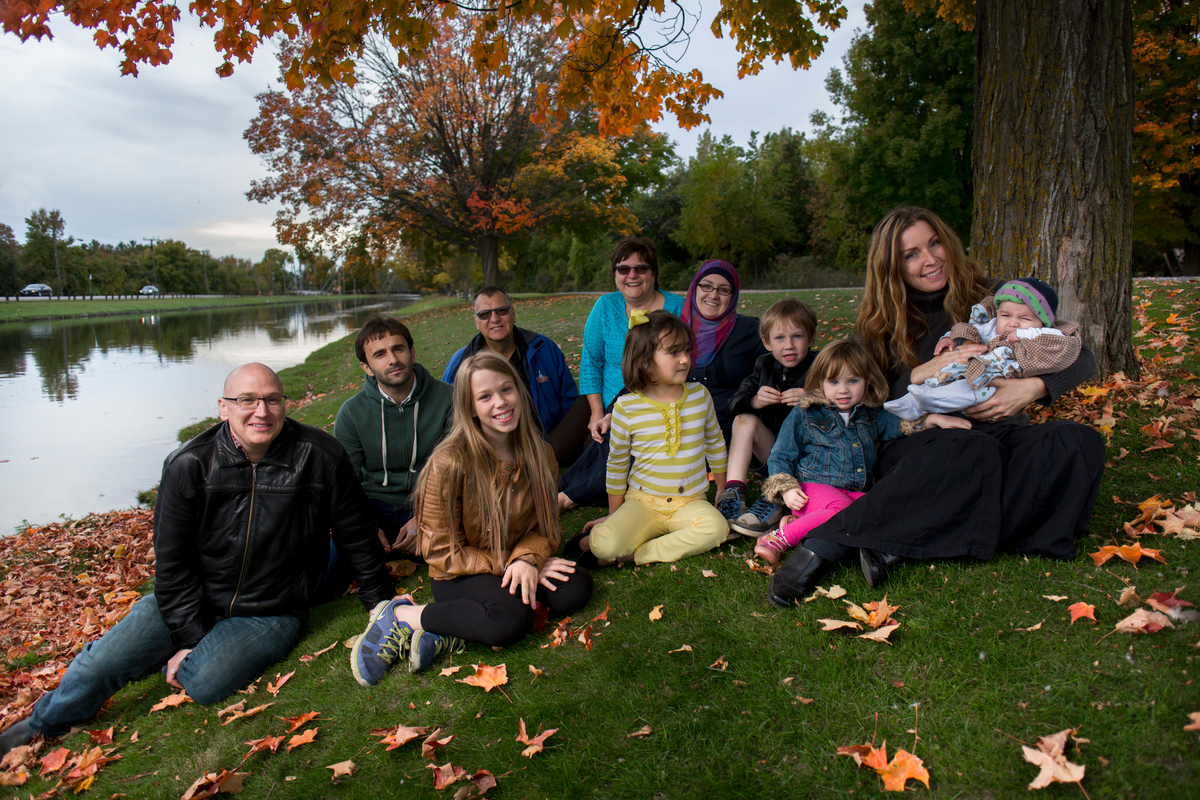How a Canadian community helped to heal the wounds of war

How a Canadian community helped to heal the wounds of war
Husam and Noura Eshadi grew up as neighbours and fell in love as teenagers in Aleppo, Syria. Married, with a baby daughter and a bright future ahead of them, they never imagined that they would one day be on the run as refugees.
But soon after little Bayan’s first birthday, fighting spilled onto the streets and their neighbourhood became a war zone. Rocket attacks and explosions became a part of everyday life. “Every time my phone rang, I worried something had happened to my daughter,” recalls Husam.
Today, one local community in Canada is coming together to offer this family a second chance at the happy life that just a few months ago seemed impossible.
“Sometimes it feels as if we’re in a dream,” Husam says. “We’re scared a moment will come and we wake up, because it’s a good dream.”
“We’ve all just done what our heart told us to do."
The Eshadis’ new group of close friends in Canada know how different it could have been.
“They’ve shared with us some of the things that have happened to them in the past since the war started,” says Joe Edwards, a retired IBM employee who, along with his wife, Tanna, dedicates most of his free time to helping the family. “It’s been very scary to think that they’ve had to go through all of these experiences and trauma.”
Before they fled, the couple had hoped to see the war through and often struggled for normalcy amid the shelling, spending summer evenings on Husam’s motorcycle.
“I would tell him, ‘I don’t care. Just take me and ride,’” says Noura.
Then, in 2011, when a rocket hit the nearby mosque on the first day of Eid, Husam and Noura knew they had to leave. They criss-crossed northern Syria before eventually journeying to Turkey, where they spent years in a refugee camp. There, Husam ruined his back working long hours on a farm in a desperate effort to pay for their passage aboard a flimsy boat to Greece – but stability was always out of reach.
Smugglers wanted US$3,000 for the perilous boat journey. Although neither Noura or her baby daughter could swim and there was no guarantee of making it to Greece alive, it became a risk worth taking.
“Death was written for us already,” says Noura. “We would die if we stayed in Syria, so what more could we lose?”
One phone call changed everything.
The Eshadi family are among the 31,000 Syrians to have been accepted for resettlement in Canada over the past year. They arrived in Peterborough – a city of 79,000 flanked by lakes and forest – in May 2016, with few possessions and no idea what to expect. To their relief, the warm welcome they received from the 15 volunteers tasked with greeting them made them feel as though they had come home.
And for volunteers, the experience has dispelled misconceptions and fostered empathy for the millions displaced by conflict. Over the past year, they have helped more than 60 Syrian families to resettle in Peterborough, with an additional 15 due in the coming months. “I was taken aback by how many people came out to support the new Canadians coming in,” says Joe.
Similar stories are emerging all over Canada, where government policy allows individuals and groups to sponsor resettled refugees. Although this involves taking on costs and obligations, Peterborough residents have not been deterred.
“We’ve all just done what our heart told us to do,” says Tanna, who, along with husband Joe, regularly offers to help the Eshadi family with transport, dinner invites and household supplies.
Husam and Noura now live in a clapboard house with a small backyard, far removed from tragedy. The birth of their second child, Adam, has only deepened their roots in the community, and volunteers refer to the boy as ‘our Canadian baby’. One member of the volunteer group, Dave, has hired Husam for part-time work as a painter, while his wife, Jennifer, visits the family often to check on them. Another volunteer, Helen, teaches Noura English.
“I know the refugees are grateful to be safe in Canada,” says Winston, who is also part of the group. “And we, as Canadians, are the fortunate ones to have them here with us. We are better for it.”
The Eshadi family will never be able to forget what they endured at home or the loved ones they left behind. At night, Husam says he doesn’t dream anymore, and he paces often. But the love and warmth of the Peterborough community has allowed Husam and Noura to look forward to a happy, promising future once more.
“I’ve found safety,” says Husam. “I’ve found friends.”
From Far and Wide is a series of stories profiling the Canadians who have welcomed Syrian refugees with compassion and support. All across the country, strangers, friends, families and communities are creating powerful bonds of friendship that transcend language and culture, when they are needed the most.




















